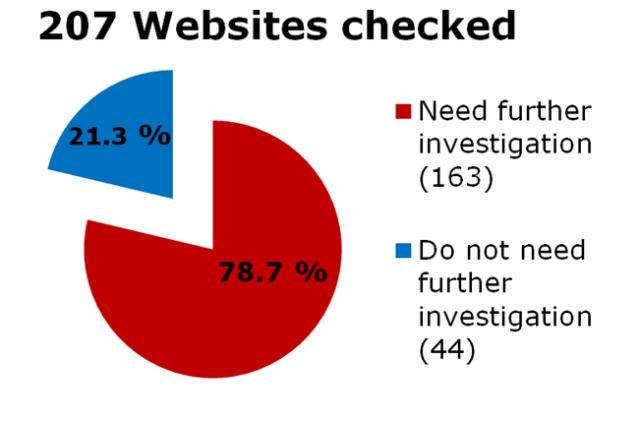The European Commission conducts regular sweeps - checking the enforcement's level of EU consumer protection measures by European websites. Last December a sweep was conducted to see whether websites selling digital consumer products (games, books, videos and music) are in compliance with EU legislation. The sweep that took place in the summer of 2012 showed that over half of the investigated websites (172 out of 330 checked websites) was not compliant with EU rules. (Q&A -
Sweep on on-line games, books, videos and music) After that sweep, the authorities issued advice and warnings to websites that were potentially in breach of EU rules. As a result, the repeated sweep revealed that out of 172 previously non-compliant websites, 116 have been corrected. Altogether, 80% of the examined 330 websites is now compliant with EU consumer law. (
Better protection for EU Consumers downloading games, e-books, videos and music) This means that consumers should be getting better information nowadays on products' attributes, should be informed fully and comprehensively on their rights (e.g., the fact that when the download starts consumers lose their right of withdrawal), on how to contact the sellers with their complaints, have been provided with fair contract terms. The conducted studies revealed also that consumers are still insufficiently informed about the following facts:
that they are giving up their right of withdrawal with the start of a download (42% websites don't provide this information);
that they have a right to take a legal action or claim compensation when the product doesn't work;
how to contact the trader;
that the product may have geographical restrictions that would make it impossible to use it abroad if consumers travel;
that digital games that are advertised as 'free' could upon downloading and use still requirement certain payments being made.
The enforcement actions will continue to be conducted. It is especially relevant to increase children protection when purchasing digital goods, since they are often users of digital goods and are more vulnerable consumers, more prone to succumb to misleading commercial practices.
The European Commission advises consumers to think whether they have an answer to the following questions prior to making a purchase decision:
Can you contact the trader in case there is a problem? Make sure that the trader provides his name, geographical and e-mail address.
Do you have all the information you need about how to run the download? Check that you are given sufficient information and minimum operating system requirements of the product such as size, quality and whether a device or particular software is needed in order to operate the digital content product.
How much is it really going to cost? Look out for the final price; including taxes and all charges that may be hidden in the last stages of the payment process.
Do you have a right of return? Be aware that once you have started downloading the product, you have usually no right to return it.
Are your rights being restricted? Beware of terms that exclude the trader from various liabilities and redress mechanisms including legal action; they are probably unfair.
Where can you use the digital content? Look for information whether you can use the digital content in another country than the one you live in. You may get a nasty surprise if you are travelling or on holiday. Contact the sales office for advice, if you do not find the information.
What is the real cost of the "free" kids game? There might be add-ons requiring payment without you being warned about it beforehand.


